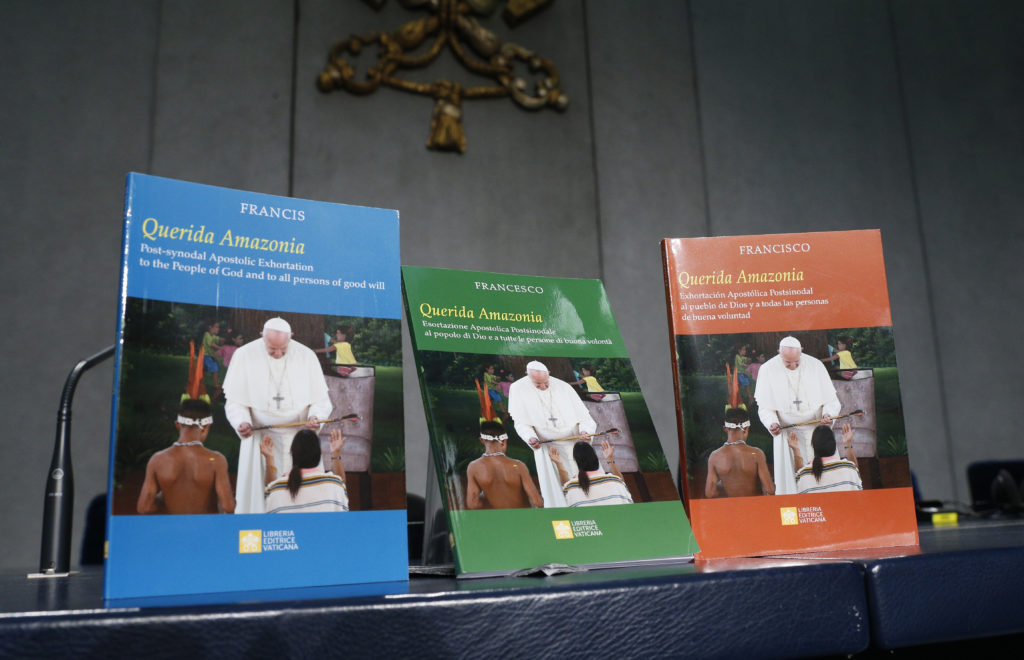"The whole text is a hymn, a praise for the beauty that God offers us.". With these words, Cardinal Claudio Hummes, president of the Pan-Amazonian Ecclesial Network (Repam), has commented on the apostolic exhortation Dear Amazonia of Pope Francis, fruit of last October's Synod of Bishops, of which Hummes himself was general rapporteur.
One of the auditors, the thirty-three-year-old indigenous Yesica Patiachi, also expressed her happiness, explaining how the pontifical text, which is now part of the ordinary Magisterium of the Church, is basically the "most beautiful coronation of all the work done in these years".recognizing that Pope Francis is being confirmed as the "the only world leader who has truly understood that a crucial game for humanity is being played in Amazonia.".
Observing the mood on the eve of publication, many expected an exhortation that would follow to the letter the points of the Final Document of the Synod and "approve", or "disapprove" in particular those questions that were inevitably left pending last time, since the last word always belongs to the Pope.
Pope's final document
Pope Francis has surprised once again and has launched his own proposal, adding to the final Document - which he invites us to take into account in its entirety and make of it a special treasure - four new dreams that, as he says, he has managed to have after the Synodal experience: a social dream (attention to the poor, to the native peoples and their rights), a cultural dream (attention to the beauty of the territory), an ecological dream (attention to the vital environment and its custody) and an ecclesial dream (new evangelization and inculturation). Dreams undoubtedly desired for the Amazon, but given to the whole Church.
Therefore, in the text - which is developed in 111 points and 4 chapters, plus an introduction and a conclusion - the Pope never refers to the Final Document, and reiterates it explicitly; rather, he runs through the diagnosis of the Instrumentum laboris of the Synod, cites some of his previous encyclicals (Laudato si'The author uses indigenous writers and poets to circumscribe and narrate his hopes for the Church in the Amazon region.
With regard to the references to documents of the pontificate written in the past, which the Pope invites us to reread, it is clearly shown that the Amazon amalgamates and, in a certain sense, contains all the aspirations and concerns of the entire Church. And thus it becomes a great reference point for the renaissance of universal evangelization, following these 4 dreams of the Pope on a global level. It also seems to demonstrate that everything Francis intended to say throughout his Pontificate has basically already been said, and only needs to be put into practice and adapted to different circumstances. In short, one could almost say that it is a kind of spiritual testament.
Regarding the "hot" points that animated the debates that preceded the Synod, in the exhortation the Pope seems to want to confirm his attitude of "not occupying spaces but initiating processes". In fact, in the text he makes it clear that all those needs and expectations that arose in a somewhat hurried manner can mature over time, in the light of the wisdom and motherhood of the Church, without necessarily establishing something concrete now. Some references, for example, are to the "Amazonian rite" (n. 79 and following), to access to the sacraments (n. 84) and to "ministeriality" (85).
Permanent Deacons
On the other hand, the position of the Holy Father on the ordination of permanent deacons who can be ordained priests is very clear: he does not make any reference to it; rather, he values the figure of the priest by affirming that only he can administer the Eucharist, which is what "makes the Church". The proposed solution is: to pray more for vocations and to encourage new missionary priests for the Amazon, as well as to value more and more the role of the laity and their protagonism, which must be combined with the need for the Eucharistic celebration (87-94), which always remains the priority. The Pontiff also closes the doors, in a reasoned way and for the umpteenth time, to the ordination of women (100-103), but emphasizing and enhancing the necessary and fundamental "feminine footprint" for the whole Church. It is clear that the journey has only just begun and that we must make sure that it opens new horizons for the good of the Amazon and of the whole Church, valuing what Pope Francis has said about the urgency of the proclamation of the kerygma.
The synodal debate and the Holy Father's conclusions are framed within the framework of the Laudato si'with its reflections also linked to the awareness of the ecological impact and the "everything is connected" of today's society. Concerns that have been confirmed by the scientific community - as reiterated by the 2007 Nobel Laureate Carlos Nobre during the press conference to present the Document - and that today assume a universal role in the commitment of all, thanks to the Church and the Pope.









